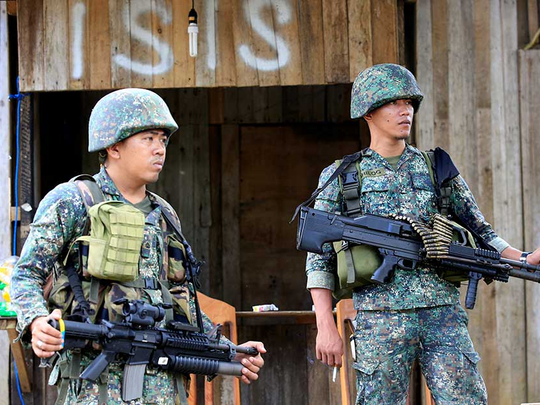
SINGAPORE: Malaysia, the Philippines and Indonesia will launch joint patrols in waters off the Mindanao region this month to counter threats from Daesh militants, Malaysia’s defence minister said on Saturday.
Hishammuddin Hussain made the comments at a security conference in Singapore as Philippine troops continued to battle self-styled Daesh gunmen who attacked the city of Marawi on Mindanao island nearly two weeks ago.
Hussain said joint sea patrols in the waters bordering the three nations would kick off on June 19, with air patrols starting at a later date.
Philippine President Rodrigo Duterte has declared martial law in Mindanao in response to the crisis, describing the attack on Marawi as the start of a major campaign by Daesh to establish a foothold in the Philippines.
Security analysts say Daesh is planning to establish a “province” in the southern island of Mindanao as part of its efforts to set up a caliphate in Southeast Asia.
“If you talk about Sulu Straits (it) ... would involve Malaysia, Indonesia and the Philippines,” Hussain told delegates to Shangri-La Dialogue, an annual security summit.
“So within ASEAN, we decided at least these three countries, to avoid being accused of doing nothing, the three of us took the initiative to have the joint patrol ... initiatives in the Sulu Straits,” he added, referring to the Association of Southeast Asian Nations.
Hussain said Malaysia, Indonesia and Singapore have carried out successful joint patrols in the Malacca Strait bordering their countries to fight maritime piracy.
Analysts have said the porous maritime borders between the three countries make it hard to detect the movement of militants.
Mindanao is “the primary area in the region where Islamist militant groups are still able to operate with some freedom of operation, run training camps, and conduct frequent attacks”, said Otso Iho, senior analyst at IHS Jane’s Terrorism and Insurgency Centre (JTIC).
“This level of lawlessness and the fact that the space is difficult for government forces and institutions to effectively govern makes it the most likely place for a declaration,” he told AFP.
“It’s also the location where the vast majority of Southeast Asian groups that have pledged allegiance to Daesh are based.”
Hussain and other defence ministers who spoke at the conference also warned of the threat posed by returning Southeast Asian militants who are fighting with Daesh in Iraq and Syria where the group is losing territory.
“This however then gives rise to the disturbing prospect that the Asia-Pacific is now in Daesh’s crosshairs,” he said.
The threat is “real and multidimensional, whether from returning fighters, regional franchises or more disturbingly, from self-radicalised lone wolves”, he added.












